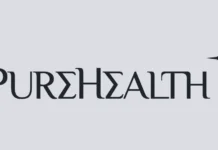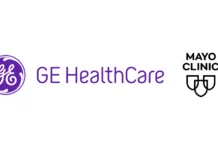GE Healthcare has unveiled the GE Blueprint for low dose, a comprehensive program that helps healthcare providers integrate CT technologies, education and process improvements, and data analysis to reduce patient radiation dose from Computed Tomography (CT) by up to 50 percent. GE Healthcare is committing to work with health systems and physicians to develop system-specific solutions – comprehensive “blueprints” that can help providers achieve low-dose, high-definition diagnostic capabilities. The program is designed to help health systems nationwide positively impact patient safety.
“By installing new imaging technology that uses lower radiation doses for CT scans, the North Shore-LIJ Health System is addressing an important factor that can contribute to excess radiation dosing”
GE Chairman and CEO Jeffrey Immelt and North Shore-LIJ Health System President and CEO Michael Dowling unveiled the GE Blueprint for low dose today at North Shore-LIJ’s Center for Advanced Medicine. Following the model set by North Shore-LIJ, GE plans to engage with leading health systems across the U.S. – representing 3,500 hospitals with 70% of all hospital admissions nationally – to share the GE Blueprint for low dose.
Traditionally in CT high-image quality often required greater patient exposure to diagnostic radiation. Lower dose levels for the patient usually meant lower image clarity. Partnering with leading healthcare providers, GE is changing the equation. With GE’s Veo technology, for instance, physicians have achieved profoundly clear chest CT images with less than 1 millisievert (mSv) of dose – some with radiation dose levels comparable to chest X-rays. For perspective, traditional chest CT scans can expose patients to anywhere from 5-10 mSv of radiation dose, and natural background radiation exposes the average American to around 3 mSv per year.
Immelt said, “GE has provided low dose solutions for more than 30 years, and the GE Blueprint for low dose furthers our healthymagination vision of improving the cost, quality and access of healthcare. We are pleased to recognize North Shore-LIJ’s vision and efforts already on this front.”
North Shore-LIJ President and CEO Michael Dowling said, “Maintaining the lowest possible radiation dose in imaging while delivering high quality diagnostics is a top priority. We are thrilled to collaborate with GE Healthcare through this important, impactful program and to build upon our leadership in dose management and North Shore-LIJ’s commitment to ensuring the utmost in safety and care for our patients.”
Leveraging a team of “Low Dose Architects,” GE Blueprint helps health systems like North Shore-LIJ develop system-specific, end-to-end dose management programs, including staff education, process improvements, equipment assessments and CT technologies that can enable low-dose, high-definition imaging. For more information, please visit www.gehealthcare.com/GEBlueprint.
As part of their blueprint, North Shore-LIJ is incorporating 16 new advanced GE CT systems and low dose technologies, including:
DoseWatch, a first-of-its-kind management tool that helps providers measure, track and optimize patient dose over time;
Veo, a pioneering CT image reconstruction technology that is helping physicians achieve some CT scans at under 1 millisievert with profound clarity;
ASiR low dose image reconstruction technology, available across the GE Healthcare CT portfolio and used on over 1,200 systems for more than 12 million patient exams to date.
North Shore-LIJ, the largest healthcare provider in the New York City region and a recipient of the National Quality Forum’s 2010 National Quality Healthcare Award, has long been a leader in providing patient-friendly medical imaging through the use of cutting-edge medical technologies. After reviewing all imaging equipment in 2010 and instituting a three year plan to replace or upgrade more than $50 million in equipment, North Shore-LIJ achieved system-wide American College of Radiology (ACR) accreditation and 100 percent compliance with ACR’s “Image Wisely” and “Image Gently” pledges, started manually tracking CT patient exposure levels system-wide, and introduced a mandatory credentialing requirement for non-radiologists using medical radiation.
A year later, in August 2011, The Joint Commission issued a Sentinel Event Alert about the radiation risks of diagnostic imaging.
“By installing new imaging technology that uses lower radiation doses for CT scans, the North Shore-LIJ Health System is addressing an important factor that can contribute to excess radiation dosing,” said Mark R. Chassin, MD, president of The Joint Commission.
About GE Healthcare
GE Healthcare provides transformational medical technologies and services that are shaping a new age of patient care. Our broad expertise in medical imaging and information technologies, medical diagnostics, patient monitoring systems, drug discovery, biopharmaceutical manufacturing technologies, performance improvement and performance solutions services help our customers to deliver better care to more people around the world at a lower cost. In addition, we partner with healthcare leaders, striving to leverage the global policy change necessary to implement a successful shift to sustainable healthcare systems.
Our “healthymagination” vision for the future invites the world to join us on our journey as we continuously develop innovations focused on reducing costs, increasing access and improving quality around the world. Headquartered in the United Kingdom, GE Healthcare is a unit of General Electric Company. Worldwide, GE Healthcare employees are committed to serving healthcare professionals and their patients in more than 100 countries. For more information about GE Healthcare, visit our website at www.gehealthcare.com. For our latest news, please visit http://newsroom.gehealthcare.com.
About North Shore-LIJ
The nation's second-largest, non-profit, secular healthcare system, North Shore-LIJ delivers world-class clinical care throughout the New York metropolitan area, pioneering research at The Feinstein Institute for Medical Research and a visionary approach to medical education, highlighted by the Hofstra North Shore-LIJ School of Medicine. North Shore-LIJ cares for people at every stage of life at 15 hospitals, long-term care facilities and more than 200 ambulatory care centers throughout the region. North Shore-LIJ’s owned hospitals and long-term care facilities house about 5,467 beds, employ more than 10,000 nurses and have affiliations with more than 9,000 physicians. Its workforce of about 43,000 is the largest on Long Island and the ninth-largest in New York City. For more information, go to www.northshorelij.com.

















